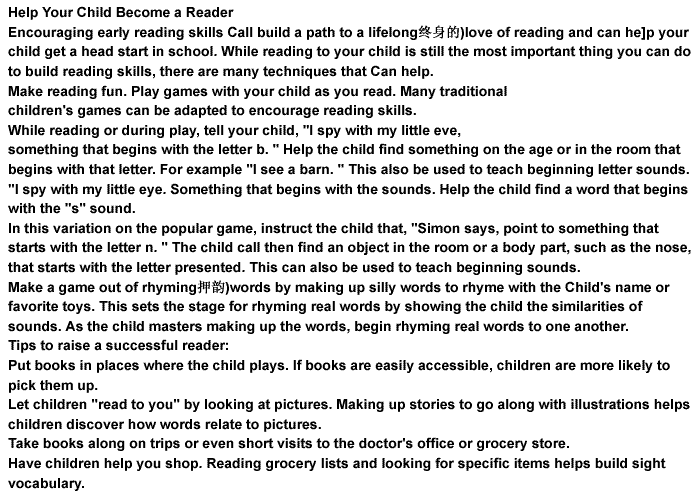 题目内容
(请给出正确答案)
题目内容
(请给出正确答案)
Help Your Child Become a Reader Encouraging early reading skills can build a path to a lif
Help Your Child Become a Reader
Encouraging early reading skills can build a path to a lifelong (终身的) love of reading and can help your child get a head start in school. While reading to your child is still the most important thing you can do to build reading skills, there are many techniques that can help.
Make reading fun. Play games with your child as you read. Many traditional children’s games can be adapted to encourage reading skills.
While reading or during play, tell your child, “I spy with my little eye, something that begins with the letter b.” Help the child find something on the page or in the room that begins with that letter. For example. “I see a barn.” This can also be used to teach beginning letter sounds. “I spy with my little eye, something that begins with the sound‘s’.” Help the child find a word that begins with the “s” sound.
In this variation on the popular game, instruct the child that, “Simon says, ‘point to something that starts with the letter n.’” The child can then find an object in the room or a body part, such as the nose, that starts with the letter presented. This can also be used to teach beginning sounds.
Make a game out of rhyming (押韵) words by making up silly words to rhyme with the child’s name of favorite toys. This sets the stage for rhyming real words by showing the child the similarities of sounds. As the child masters making up the words, begin rhyming real words to one another.
Tips to raise a successful reader:
Put books in places where the child plays. If books are easily accessible, children are more likely to pick them up.
Let children “read to you” by looking at pictures. Making up stories to go along with illustrations helps children discover how words relate to pictures.
Take books along on trips or even short visits to the doctor’s office or grocery store.
Have children help you shop. Reading grocery lists and looking for specific items helps build sight vocabulary.
A good reading habit can help your child do well at school.
A.Right
B.Wrong
C.Not mentioned
 如果结果不匹配,请 联系老师 获取答案
如果结果不匹配,请 联系老师 获取答案


 更多“Help Your Child Become a Reade…”相关的问题
更多“Help Your Child Become a Reade…”相关的问题



















